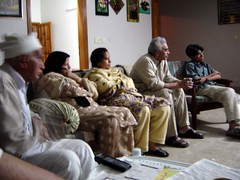Schoolchildren in the developing world may be better equipped for the demands of the 21st century than their European and American counterparts, because they are adapting faster to changing needs, a new report says. The report, from the Organization for Economic Cooperation and Development (OECD), sounds a new alarm for educators charged with ensuring their students are prepared to compete in the new global economy. (OECD)
eSchool News online – OECD sounds new education alarm
I began to see this in the 1990s, when I attended a number of iEARN conferences. I was so impressed with directions that schools were taking, not in England or France, but in the developing world. I realized then that these countries had a huge and perhaps insurmountable advantage over us in the industrial world. They were doing all of this from scratch. They were inventing their education systems, for the most part, for the first time. They were looking at their world, their current state of readiness to become a cooperative (and competitive) partner in that world, and inventing education systems that would help them to become world-ready.
In the industrial world, our education system has been so successful for so long, and it has become so ingrained in our sense of cultural expectation and entitlement, and there is so much momentum behind our antique industry-based system that we may well not be able to turn it around in time. We are so well educated, that education has become the goal, not world-readiness. It’s why we spend so much time and effort teaching our students to be good students, instead of paying attention to a rapidly changing world and adapting how and what we teach to prepare our children to prosper in a rapidly changing world.
The quote above comes from an eSchool News story on a recent report from the Organization for Economic Cooperation and Development, Education at a Glance, “…covers 30 of the world’s richest nations, but it also compares how they stack up with key non-OECD members China and India.” It points to a number of indicators that at least these two developing countries are adapting more easily to (changing) conditions in the 21st century. Among indications reported by eSchool News…
Among OECD members, East Asian countries are increasingly outperforming Europe and the United States–and they “succeed without leaving many students behind,”
Other countries show a marked contrast between high achievers and their struggling peers. More than a quarter of 15-year-olds in the United States, Italy, Mexico, Portugal, and Turkey performed at or below the lowest levels on math–and students from poor families were 3.5 times more likely to do badly.
The report also warned about increasing costs of dropping out of high school (see related story).
Adults who do not finish high school in the U.S. earn 65 percent of what people make if they do finish high school. No other country had such a severe income gap. Countries such as Finland, Belgium, Germany, and Sweden have the smallest gaps.
Personally, I do not believe that it is too late, because I suspect that no one is getting it right, just yet. The measures used to compare China and India with us are still tied to a traditional sense of being educated.
Now this is just one lowly educator, but I suspect that what will emerge as the adaptive partner of a rapidly changing, information driven, technology-rich world — the world-ready citizen — will not be so much the one who has received the most advanced degree, and perform the deepest calculus, or can debug a condensed microprocessor. It will be the person who can innovate. It will be the person who can observe, invent, and who as the skills to resourcefully use his information environment to learn what he needs to know to do what he needs to do.
I’ve said all of this before. But I suspect that I’ll keep saying it, until we have decided to relax, free and empower our teachers and students, step outside of the box, and had faith in our own ability to joyfully innovate.
Finally, the eSchool News story closed with…
The U.S. government spends more per student from elementary school through college–$12,023–than all countries except Switzerland.
I would like to understand this better. Perhaps llarry will help. But I suspect that much of that is paying for our efforts to be democratic in our education, and I know that democracy costs. I’m not saying that we have done this well and the discrepancy between high achievers and low achievers and the abysmal dropout rate in my country indicates that we’re doing things wrong. But I think that we should be WILLING to pay what ever it costs to do this thing right. It’s our future, not just our children’s future.
“OECD Sounds New Education Alarm.” eSchool News Online 14 Sep 2006 16 Sep 2006 <http://www.eschoolnews.com/news/showStoryRSS.cfm?ArticleID=6584>
technorati tags:warlick, education, oecd
Blogged with Flock



 I usually don’t go giddy about a new technology, especially one that isn’t even available yet, but I keep thinking about this iTV thing. So many new technologies are hand tools, something you hold, show, is seen, and it electrifies or illuminates something. What’s different about this iTV, is that you really don’t look at it, or handle it, or show anything to anyone that they haven’t already seen. But it is a great connector.
I usually don’t go giddy about a new technology, especially one that isn’t even available yet, but I keep thinking about this iTV thing. So many new technologies are hand tools, something you hold, show, is seen, and it electrifies or illuminates something. What’s different about this iTV, is that you really don’t look at it, or handle it, or show anything to anyone that they haven’t already seen. But it is a great connector. OK, let me see if I have this right. You connect your $299 iTV (out first of next year) to your classroom TV or increasingly ubiquitous classroom projector. Now you buy movies from the iTunes Music Store, download them directly into your computer, and you can play them to your class — through the air. Not that you would!
OK, let me see if I have this right. You connect your $299 iTV (out first of next year) to your classroom TV or increasingly ubiquitous classroom projector. Now you buy movies from the iTunes Music Store, download them directly into your computer, and you can play them to your class — through the air. Not that you would!